Nijmegen: "Too small to blog about"
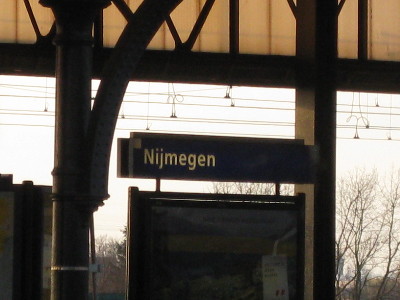
A horrible thing to say about a town. But yes, Nijmegen is small: 140,000 people or so. I see from wikipedia that some would lump in Nijmegen in the Randstad, a metropolis that if you squint long enough encompasses the whole of the Netherlands. That strikes me as special pleading: yes, everything is close to everything else by train. For example, if you want sushi in Nijmegen, you get on the train to Arnhem, a mere 15 minutes away. But you are still going through a bunch of forest to do it; and the Randstad is so called because its cities (stad) are on the edge (rand) of a bunch of trees and/or water. So no, in my book, Nijmegen is small.
It's cute, which comes with being small. Well, the mediaeval Stadhuis (town hall) is cute: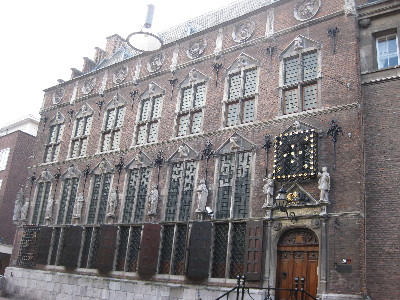
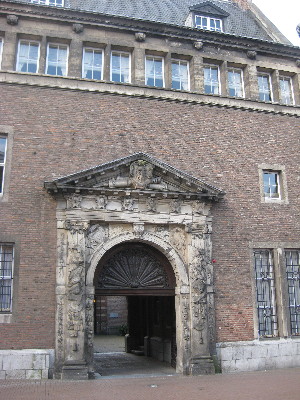
I was struck by the fact that Nijmegen has an Italian (and Spanish) name, Nimega. The Spanish name could have just been a reflection of the Spanish rulers' discomfort with Dutch (and Dutch Low Saxon) diphthongs (Dutch Low Saxon: Nimwegen)—
I had no idea that the Netherlands spoke not only Frisian, to the north, and Dutch, but also Low Saxon to the East—which, in anything but name, is Low German. Dutch in fact was originally the language of just Holland; and the Netherlands is bigger than Holland. You'll notice I've been scrupulous about saying Netherlands. More on that later.
—but the fact that Italian uses the word too made me accurately conclude that Nijmegen was a mediaeval centre of commerce. The Stadhuis is classy enough to reflect that.
And the downtown is cute:
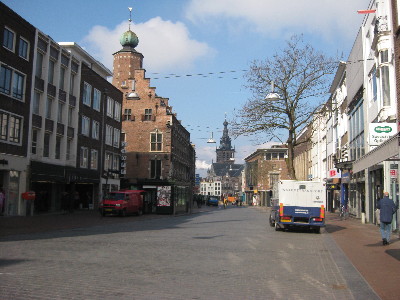
Pretty compact; and I was astonished when Sonja (Sebastian's girlfriend, chez whose laundry I was crashing) ducked into a doorway opposite the local Dixon's: the downtown shopping centre is all residential upstairs from the shops, and indeed in inconspicuous wedges between shops.
(I was also astonished that a British electronics chain store, which gave me the wrong bloody adapter for my eeePC in Heathrow, would turn up in Nijmegen. But that's globalisation for you.)
The little drinkeries open at night were even more cute, except for that hellhole playing loud crap remixes of '80s tunes and with whooping Nijmegen Uni students being nuisances. Sebastian and Sonja were suitably apologetic, but not enough to make me want to stick around there. But the first drinkery was cute, what with its "would you like some free mints?" and special smoking room and easy-going bar staff; and the deserted final drinkery (a real local's place, dark and cozy and pleasantly grotty) was even more cute.
I was arrived in Nijmegen to drink and reminisce with Sebastian, not necessarily in that order. The drinking glass sizes threw me off: what they call a small beer glass was indistinguishable from a shot glass, and what they call a large beer glass wasn't much larger. I clearly wasn't in Australia. But I did learn all the Dutch I would ever need there. Well, more than I needed, since they all spoke English, but enough to ingratiate myself with the bar staff:
"Twee Amsterdameltje vaan Dommeltsch en één bruin Duvel, alstublieft."
Which translates to:
"Two small-sized water tumblers (which you have the temerity to regard as "large" drinking vessels) of the local generic lager, which I'm not even going to dignify with my attention; and a single goblet of the slightly but not very stout rendering of one of the fine assortments of Belgic ales you have on tap, my good man, and I think I have just exhausted my knowledge of Dutch."
*hic*
To my amazement, I woke up the next morning. I didn't have *that* much to drink, but I was out of practice: A mere four mid-sized glasses of beer (the last out of deference to the pleasantly grotty place, since I'd already bailed out to lemonade in the college bar). And that Gueuze in Brussels on the way up, of course. Mm, gueuze.
The education precinct of Nijmegen is not cute. The Max Planck, at least, attempts the monumentality of squares (and fails, because gray brick is not monumental, it's a suburban reception centre):

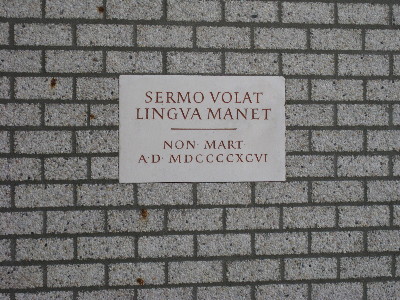
I didn't have the heart to photo the building itself, it was blah. The Latin as cute: at least someone was bothering not only to do Latin inscriptions on buildings in AD 1996, but to date things on the Nones of March. A lot less people know what the Nones of March are than know the Ides of March.
The inscription itself, I wasn't as happy with. It's a take-off of the old standby Verba volant, scripta manent: spoken words fly away, written words stay behind. (Unless they're on digital media more than five years old, but I digress.) The version here was, Sermo volat, lingua manet: speech flies away, language stays behind.
Now, that could be a Saussurean distinction between langue (the abstract linguistic systems that linguists study), and parole (the stuff that actually comes out of people's mouths). Very Chomskian line to take if that's what they meant, but psycholinguists actually use parole more than most linguists to work out what linguistic structures are; so it's an odd slight to make, especially in Latin. Or it could be some optimistic statement (not that distant from the first) that words are temporary but languages are forever. Given the rate of language extinction in the world, that's not too prudent a statement either.
Nijmegen Uni (formerly Nijmegen Catholic U, now Nijmegen U named after Catholic Bishop Radboud) is not even trying to look monumental: it's just bad mid-20th century concrete. I was looking forward to the experience of a German (or Dutch) mensa (university cafeteria). I didn't quite get there in Nijmegen U, but at least I know to avoid the filet américain (see enteraining fulminations at Yahoo Answers, where the answers may not be correct, but they are funny). Bad enough as steak tartare on a plate; but in a salami tube as a squirtable topping? Just say no.
As already alluded to, lots of Australian linguists there, some of whom even asked me what my PhD topic had been...
Wenn sie fragen, wer i g'wesen bin:
Tambour von der Leibkompanie!
(That's being deliberately abstruse too. Some other blog post perhaps.)
Oh, and I got to say goodbye to Sebastian and Sonja about four times. I kept planning to leave Nijmegen and getting stranded. At least I caught up with my blog posts for the day.
OK, one more Dutch Sojourn posting to go.

 Loading...
Loading...




2 comments:
If they are going to do the Nones of March, they could at least do A.U.C dates instead of Æra Communis.
And as for them talking Niederdeutsch in the Netherlands, never assume the national boundary has anything to do with the language boundary.
"Conversation wings through the air all the while your tongue stays stuck to the pavement", how about that? With a side reference to Psalm 119, "Adhaesit pavimento animam meam", so neatly quoted by Dante in (but not from) Purgatory.
(I remember a tale from somewhere of a professor who asked for final papers on the Ides of April. Naturally, half the class got it in on April 15, two days too late.)
Unbelievable! I guess you missed the fact that Nijmegen is the oldest city in the country, is fast growing, and it's amazing that so many people live at such a small area of land.
There's a line between criticism and posing yourself as a person far above others. No need to point out on what side of the line you landed with this blogpost.
Your amazement about the Italian name is a clear example of the lack of knowledge or interest you truly have in the subjects you target. You only want to have a negative attitude, you don't want to know. Just a hint: the romans were here. Look that up and indulge yourself in the subject. Our beer might not what you like, the sizes might be not to your taste, but we sure respect other people. But even that habit didn't settle into your attitude.
Pity.
Post a Comment